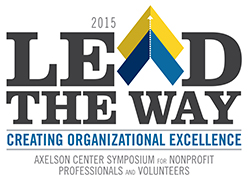Making Impulsive and Excellent Decisions

A conversation with Axelson Center Symposium keynote Nick Tasler
CHICAGO (June 8, 2015) — Nick Tasler, author and CEO of Decision Pulse, says the challenges organizations face are not between right versus wrong decisions, but right versus right decisions.
“The real challenges are those when you have three or four different possibilities, four different big goals you could pursue this year, and you can make a case for why all of them are somehow going to move you forward,” Tasler says. “The difference between excellent organizations, excellent teams, and mediocre ones, is the mediocre ones try and do all those things all at once all year long.”
At this year’s Axelson Center Symposium for Nonprofit Professionals and Volunteers, June 22 in downtown Chicago, Tasler will explore this and other ideas in his keynote presentation, “Everyday Decisiveness: Decision-Making for Organizational Excellence.”
The Symposium, hosted by North Park University’s Axelson Center for Nonprofit Management, brings together nonprofit professionals from across the sector to discuss management issues that affect all types of organizations.
Tasler is an industrial psychologist and author of two books, The Impulse Factor, and most recently, Why Quitters Win. In addition to consulting and speaking, he also writes for Harvard Business Review, Psychology Today, and Bloomberg BusinessWeek, among others.
North Park recently spoke with Tasler about his research and what he is looking forward to at this year’s Symposium.
North Park: The Impulse Factor discusses how some people have impulsive tendencies and how that can influence decision-making. You describe yourself as an impulsive and instinctive decision maker. Was that always the case and does that ever get you into trouble?
Nick Tasler: On the one hand I’ve always been a little bit more on the impulsive side. When I feel something is the right course of action I just kind of go with it. I tend to be pretty intuitive with my decision-making, but over the years I’ve realized the limitations of my impulsivity. I guess what that means is that I know the areas where I can be more instinctive and be okay but I also know the areas where I really need someone else’s guidance. I’m as impulsive now as I’ve ever been but I think what’s changed is I’ve gotten smarter about how I use it.
NP: Most of the people you work with are at an advanced level in their career. Is impulse as valuable for different levels throughout an organization, for instance when you’re working your way up and don’t have as much influence?
NT: Impulsivity is kind of high risk, high reward in a lot of ways. Particularly earlier in your career where you don’t have as much experience. Your impulsivity isn’t quite sharp or as finely tuned so it’s a little bit more dangerous to use your intuition in a space where you don’t have much actual experience. The other part about it is that there’s a career risk and there’s a social risk. I had one guy at a big health insurance company say that the risks for his career are just higher than the rewards made possible by taking a risk with his organization.
NP: Did you coach him away from that?
NT: I kind of said you’re putting parameters on your risk taking. Because the other extreme of this is you’re so afraid to take a risk that you reach a career plateau. You never trust your intuition and you need all the facts every time you make a decision. Which in most cases is just impossible. What ends up happening is you become known in the organization as a person who gets things done but nobody ever really sees you as the kind of person who can be a leader, a person who can actually step up and say “This is what I think we should do” and rally people around you. There’s never enough information, never enough facts, never enough people who have given input, and so you end up never making a decision. And that’s just as much career suicide as being too impulsive.
NP: You say some of these instinctive and impulsive behaviors stem from being part of an impulsive family. Is there a story that shines light on your family and upbringing?
NT: Well, there are many of them. The best example is that before I graduated high school, we had lived in 18 different houses and 11 different towns. We were not a military family, my parents just wanted to move, and they wanted to do something different. This is where it gets into the nature/nurture thing, so possibly I have a genetic disposition to be impulsive. I grew up in a household that was full of impulsive behavior and realized that it really wasn’t as dangerous as people thought. I’ve carried that into my approach to decision-making. People tend to think that when they make a decision it’s going to be the final judgment and that the world is going to stop turning. If it goes wrong their whole life is over and everything they know will have changed. What I learned from my childhood is that decisions are all just a bunch of mini-experiments. You make one, some of them work out, some of them don’t, and nothing really changes as dramatically as you think it was going to. I don’t put as much pressure on myself to make a decision that other people see as risky. It’s probably not going to go as sour as you might think it would.

NP: In your most recent book, Why Quitters Win, there’s this concept of right versus right decisions. What do you mean by that, and how is it different from right versus wrong decisions?
NT: Typically when people think of decisions, they think of them as right versus wrong. But when we look at the vast majority of decisions we have to make either personally or professionally, it’s rarely the right versus wrong decisions that trip us up. For instance, one of the things we are talking about at the Symposium is this notion of being excellent, or deciding to be excellent. The difference between excellence for most people and most organizations and most careers is not a matter of cutting out bad things. The challenges, the real challenges, are those when you have three or four different possibilities, four different big goals you could pursue this year, and then you can make a case why all of them are somehow going to move you forward. The difference between excellent organizations, excellent teams, and mediocre ones, is the mediocre ones try and do all those things all at once all year long. The really excellent ones separate themselves by making a choice about which of these value added things, which of these “good things,” is going to actually provide the biggest lever to create the most change. This is instead of cutting ourselves off at the knees and trying to spread our resources, our time, our energy, our people, and our creativity evenly across all of the things we could do.
NP: In some way you serve as a leader of other leaders. Do you view everyone in an organization as some kind of leader or is there a difference in leading individuals on a team versus leading other leaders?
NT: There is a difference in that some people have more formal authority than others. When they make a call everyone has to go along with it, or at least those others don’t have as much authority to push back. With that being said there still are people at every level of an organization whose judgment is needed, who have the ability to make a decision and can actually influence people. And maybe it’s not a decision that’s necessarily carried out but you bring input to that decision, rather than going along with what everybody else is saying. And there is, getting back to the first part of our conversation, of course a risk that goes along with that. In my mind, I think a leader is someone who is accountable for the uncertainty and ambiguity in an organization and can stand behind a direction to move in.
NP: You’re giving the keynote at this year’s Axelson Center Symposium. What are you looking forward to?
NT: One thing I’m definitely looking forward to is the kind of audience who’s going to be there. It draws on all these people who serve in an organization with some kind of social mission. I find working with those kinds of audiences to be very personally rewarding. I like working with for-profit corporations too, but I also find that there’s something inspiring about people who have given over their everyday existence, their vocation, to advancing a social cause.
With that, a lot of the work I do is with large corporations and so I like getting the diversity perspective from different-sized organizations. This can sometimes include smaller staffs and smaller budgets. The issues can be different, but sometimes the same. I like to cross-reference the issues they’re facing with the issues the big corporate clients are facing and pull out major themes. This is where the researcher in me gets excited.
Registration for the Symposium is open until 5:00 pm on June 17. Review the entire event program and register at www.northpark.edu/symposium.
About the Axelson Center
The Axelson Center for Nonprofit Management at North Park University is the source for informative and engaging nonprofit professional development in the Chicago region. Through regular workshops, a BootCamp for new nonprofit CEOs, customized trainings and the Annual Symposium, the Axelson Center delivers a superior educational experience for nonprofit managers, leaders and frontline staff, covering a vast array of topics from program evaluation to strategic planning, and communications to financial management. The valuable information presented through these programs enhances the impact of both the nonprofit sector and its professional staff. Visit www.northpark.edu/axelson for more information, including a full schedule of upcoming events.
Use @npu to follow North Park University on Twitter. Learn more about North Park University.

